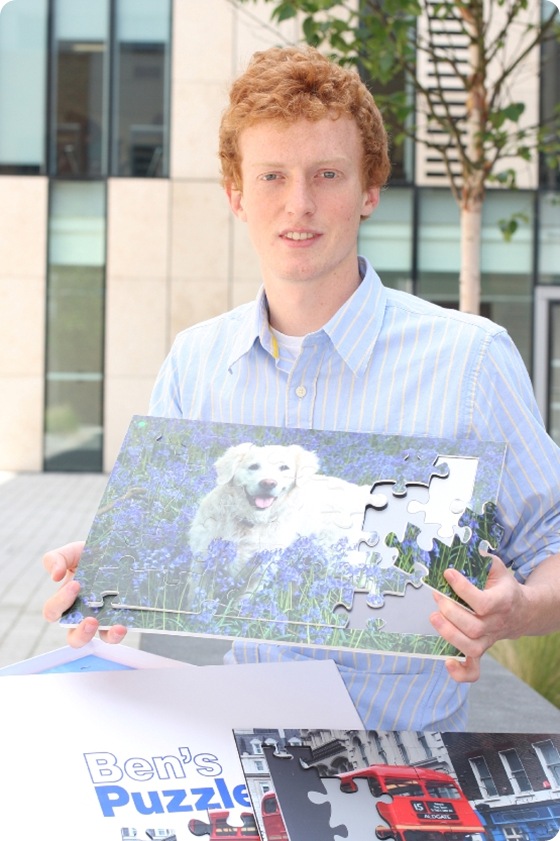Jun 23 2009
A Kingston University design student has turned his coursework into a budding business venture, launching a jigsaw puzzle ideal for people living with dementia.
Ben Atkinson-Willes, 22, who is completing a degree in product and furniture design at Kingston University in South West London this year, was inspired to use his skills to create a specially-designed activity puzzle after his granddad was diagnosed with Alzheimer's disease.
"It's important to keep people with Alzheimer's as physically and mentally active for as long as possible, because it gives them a better quality of life in the long run," Ben explained. "One thing my granddad loves doing is puzzles, but the products with fewer pieces were generally designed for very young children. I wanted to create something that would suit his need and respect his age."
Ben trialled possible puzzle images, which include a Spitfire aircraft, train, dog and family at the beach, during research in care homes around Surrey. "I started with more than 70 images, but the eight I have chosen were not only popular, but even prompted memories for some of the adults completing them," Ben said. "One resident, who hadn't spoken all day during our testing, began talking about his time in the war when he completed the puzzle with a picture of a Spitfire," Ben said. This result, Ben explained, was especially important as people with Alzheimer's often became more distant and reluctant to get involved in tasks as their confidence waned. "The puzzle sparked a memory for him, and the sense of achievement he gained completing the activity is what my project is all about," Ben said.
Ben's puzzles are made from foamex, a material which creates a long-lasting, durable, flexible and easy-to-clean puzzle piece. He has drawn on traditional puzzle shapes for each segment, but the edge of the picture is already complete and the puzzle shapes are chunkier and easier to handle. A background designed for contrast and low vision guides users to help them match and place the pieces in the correct position.
Ben's project got under way a year ago in his second year at Kingston University. He secured £5,000 funding from the University's Entrepreneurial Grant Scheme to pay for all the materials, research, prototypes, and marketing including a website.
Professor Hilary Dalke, a researcher who specialises in inclusive design for dementia care, supported and advised Ben with his puzzle project. "Devising special activities for people with dementia is a key part of their ongoing treatment. Ben's work meets a real need in dementia care products, not only for those with the condition, but for the families who need a more interesting and appropriate way of spending their valuable leisure and social time with their loved ones," she said.
Ben has already gained European Design Registration for his puzzle concept which has now gone into production. He hopes it could also be useful for other people who have suffered some degree of memory loss or diminishing vision. The puzzles have already attracted the attention of leading retailer John Lewis as well as the prestigious Audi Design Foundation.
For Ben, however, the success of his business project will also have significance closer to home. With dementia affecting some 417,000 people in the United Kingdom, there are many families alongside his own who could benefit from such a simple and effective product, he said. "My family has been behind me all the way and really kept me going on what has been a long project. Seeing my granddad's reaction to my work, the sense of achievement he gained and his enjoyment of the pictures, has been a huge driving force behind my determination to make a success of this project," Ben said.
http://www.kingston.ac.uk